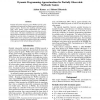Free Online Productivity Tools
i2Speak
i2Symbol
i2OCR
iTex2Img
iWeb2Print
iWeb2Shot
i2Type
iPdf2Split
iPdf2Merge
i2Bopomofo
i2Arabic
i2Style
i2Image
i2PDF
iLatex2Rtf
Sci2ools
114
click to vote
FLAIRS
2009
2009
Dynamic Programming Approximations for Partially Observable Stochastic Games
Partially observable stochastic games (POSGs) provide a rich mathematical framework for planning under uncertainty by a group of agents. However, this modeling advantage comes with a price, namely a high computational cost. Solving POSGs optimally quickly becomes intractable after a few decision cycles. Our main contribution is to provide bounded approximation techniques, which enable us to scale POSG algorithms by several orders of magnitude. We study both the POSG model and its cooperative counterpart, DEC-POMDP. Experiments on a number of problems confirm the scalability of our approach while still providing useful policies.
Artificial Intelligence | Decision Cycles | FLAIRS 2009 | Modeling Advantage | Rich Mathematical Framework |
Related Content
| Added | 17 Feb 2011 |
| Updated | 17 Feb 2011 |
| Type | Journal |
| Year | 2009 |
| Where | FLAIRS |
| Authors | Akshat Kumar, Shlomo Zilberstein |
Comments (0)

